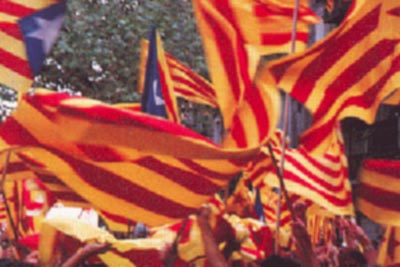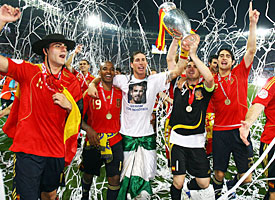With the world getting into the mood for World Cup 2010, my mind goes back to the most incredible World Cup of all time – the 2002 World Cup. None of the earlier World Cups (or the later one in 2006) can measure up for sheer excitement, drama, intrigue, fun, surprises and entertainment. It was a World Cup no true football fan would ever forget.
We should have known we were in for something special when Senegal stunned France 1-0 in the opening match in Seoul. The tone was set when Papa Bouba Diop scored past Fabien Barthez, and all the Senegalese players gathered at the corner flag and did an African tribal dance round an imaginary campfire. It heralded the start of the Senegal story, in which the unfancied African nation went all the way to the quarter-finals. Astonishingly, defending champions France then drew with Uruguay and lost to Denmark, exiting the competition in the group stage without scoring a goal!
Argentina was one of the nations with the best records in the qualifying campaign for the World Cup. And they were blessed with great entertainers like Claudio Lopez, Hernan Crespo and Juan Sebastian Veron. They were expected to challenge for the title, but they shocked everyone by getting knocked out in the group stage. They drew with Nigeria and Sweden, and lost to England in a momentous match in which David Beckham scored a brilliantly disguised penalty. That match was also pivotal for England, as it ensured their progress to the next round.
Portugal was another country who were fancied to go all the way. Their players had been heralded the “Golden Generation”, and included Luis Figo, Rui Costa and Nuno Gomes. They took to the field against the USA expecting to win. But they were in for a rude shock. The Americans scored 3 goals in the first half to lead 3-1. Portugal fought back to 3-2 and laid siege to the American goal. But it was not to be. The cat was well and truly among the pigeons. After both Portugal and co-hosts South Korea beat Poland, the two nations met for an all-or-nothing showdown. With a fanatical national following, the South Koreans delivered a 1-0 victory, and were through the 2nd round. The Golden Generation had failed. We can still remember Luis Figo in tears after the match.
The Germans are not known for their attacking instincts, but they woke up one day thinking they were Brazil, and duly hammered Saudi Arabia 8-0. Speaking of Brazil, they took to the field against Turkey, and got a rude shock when the Turks went in front. They fought back to win 2-1, a victory soured when Rivaldo play-acted to get an opponent sent off. Both teams qualified for the next stage, and were destined to meet again. Two other favourites for the trophy, Spain and Italy, made smooth progress to the knock out stages.
One of the stories of the World Cup came from a team which didn’t even go very far – Ireland. Captain Roy Keane was so exasperated with the pathetic training facilities and the defeatist attitude of Mick “It’s a big deal that we’re even in the World Cup” McCarthy that he blasted his manager in front of all the players. There was no way Roy Keane could remain in the team camp, and was sent home rightaway. The man had a way when it came to ending his association with teams. Just ask Manchester United fans what happened three years later in 2005!
After a first round of shocks, the knock outs began in earnest. Germany edged out Paraguay, the USA defeated neighbours Mexico, and England were too strong for Denmark. Senegal and Sweden slugged it out in an energy-sapping contest before the Africans prevailed in extra time. On one momentous day, both the co-hosts took to the field. Japan seemed to have the easier task against Turkey, but the Japanese following underestimated the wily Turks, who conjured up a 1-0 victory, causing free flow of tears in the country.
A few hours later, South Korea took on Italy. We all know what happened.
Ahn Jung Hwan missed a penalty in the 3rd minute. It seemed like it was not their day. Christian Vieri put Italy ahead, and as the final whistle approached, it looked like another professional Italian job. But Seol Ki Hyeon stunned the Italians with an 89th minute equalizer. The match went to extra time. Totti was sent off for a blatant dive in the box, and Trappattoni could be seen hammering a hoarding. Then Ahn Jung Hwan rose above Paolo Maldini to head the “golden goal” winner, and the stadium went mad. As did the millions of Koreans watching all over the country. The Italians went back with their tails between their legs, complaining that the Koreans cheated. Well, we can’t all be upright like the Italians, can we?
The Irish showed great spirit to take Spain to penalties. But they took some of the worst penalties ever seen, and the Spaniards finished them off with aplomb. Brazil circumvented a potential banana skin in Belgium, and recorded a routine 2-0 victory. England awaited in the quarter-finals.
That quarter-final was another of the unforgettable matches of World Cup 2002. England had the best defence at the World Cup, conceding only one goal in four matches. Rio Ferdinand and Sol Campbell had formed a formidable defensive partnership in front of David Seaman, and Nicky Butt had done such a great job shielding the defence that Pele called him his player of the tournament. Trying to pry open this backline was the best attack at the tournament, comprising of the 3 Rs: Ronaldo, Rivaldo and Ronaldinho.
The match started with Brazil gamely trying to unlock the English defence. The game needed a goal to light it up. It arrived when Lucio made a defensive error and Michael Owen pounced to put England ahead. England had something to cling on to. Half time approached, and it appeared that England would go into the break with a lead to defend.
Ronaldinho had other ideas. Picking the ball up at the halfway line, he started running at player after player. Shades of Maradona in 1986. Then he laid the ball with a perfectly weighted pass, and Rivaldo sneaked in on the right. Getting the ball onto his favoured left foot, he placed it past David Seaman. 1-1 at half time.
Early in the second half. Paul Scholes fouls Ronaldinho way out to the left of the English goal. The entire English defence expects a cross. Ronaldinho swings at it with his right boot, and to everyone’s astonishment, the ball loops over David Seaman and into the goal! Did he mean it? We’ll never know.
The next chapter in the South Korea story unfolded when Spain awaited in the quarter-finals. The Koreans rode their luck with some dodgy refereeing calls, took the match to penalties, and scored five superb penalties to knock out Spain.
After knocking out Poland, Portugal, Italy and Spain in earlier rounds, another European side, Germany, awaited the Koreans in the semi-final. Surely they were not going to get past the Germans and enter the final in Yokohama, annoying their neighbours in the process? They were not. The Germans outdid the Koreans in the department of precise, defensive and physical football. South Korea’s lack of a world-class goalscoring striker was also exposed. Germany squeezed a 1-0 victory and ended the Korean dream. But they were already heroes for the Korean nation. There were celebrations even north of the border. This remarkable World Cup was enough for Guus Hiddink to become a national hero and the Korean players to build good careers in Europe.
South Korea’s opponents in the 3rd place playoff were equally surprising – Turkey. The Turks went further than anybody predicted, beating co-hosts Japan in the 2nd Round and Senegal in the quarter-finals before coming unstuck against a Rivaldo-inspired Brazil in the semi-finals. Another surprising quarter-finalist was the USA, who lost to eventual finalists Germany.
After a World Cup of surprises, the very fact that the final comprised of two familiar teams (Brazil and Germany) was a surprise. The two finalists couldn’t be more different. One South American, the other European. One attack-minded, the other defensive. One was all about artistry, the other was all about precision.
A subplot circled around Ronaldo, who was part of that ill-fated final loss to France four years ago, when he suffered a fit in the dressing room prior to kick-off, was taken off the team sheet, and then reinstated for mysterious reasons. Ronaldo played like a shadow of himself that day, just like the rest of the Brazil team. Now four years on, there was a chance for both Ronaldo and the team to put the unfinished business to bed.
Ronaldo had had a great goalscoring campaign, with 6 in 6 games. Rivaldo’s creative magic was largely responsible for the output in front of goal. And they had just unearthed the find of the tournament in Ronaldinho. The Germans had the tournament’s best goalkeeper in Oliver Kahn, who had conceded just 2 goals in 6 games.
After a sideshow that involved Turkey beating South Korea to win third place, the two great footballing nations took to the field for the final. Keeping up with this World Cup’s adherence to sheer entertainment, it was the artistic entertainers from South America who prevailed. Rivaldo created two goals, Ronaldo score both, and Oliver Kahn undid all his good work with a schoolboy error for the first goal. At the final whistle, commentator Steve Banyard said, “Guess who has won? Brazil has won, because this is the World Cup final, and they almost always win!”
The “almost” was of course a reference to what happened four years ago. Now there was redemption for Brazil and for Ronaldo. The pendulum had swung back to South America, and to attacking football. In this, the most memorable World Cup of all, it was fitting that the philosophy of positive, attacking football triumphed.
 Demonstrators with the Catalan national flag
Demonstrators with the Catalan national flag
